Anthony Quinn in The Guardian:
 Fifty years since their dissolution in April 1970 the Beatles live on. The band’s music, their significance and their individual personalities exert a hold on the cultural consciousness that seems to tighten as their heyday recedes. But is there anything new to say? Craig Brown’s One Two Three Four, the latest to enter the crowded library of Beatles books, is not a biography so much as a group portrait in vignettes, a rearrangement of stories and legends whose trick is to make them gleam anew. The subtitle, The Beatles in Time, marks out the book’s difference from the rest. Brown goes on Beatles jaunts around Liverpool and Hamburg, visits fan festivals, tests the strength of the industry that has agglomerated around them. So many of the clubs where they played are now lost or changed beyond recognition – “a memory of a memory” – and the fans who do the pilgrimages are simply chasing shadows. Brown, the arch-satirist, is wry about the 1,000-plus Beatles tribute acts worldwide. At times, the slightly desperate nostalgia of International Beatle Week in Liverpool reminds him of his parents watching The Good Old Days in the 1970s, a collective delusion that the dead can be revived. But then he watches tribute band the Fab Four play She Loves You and he’s transported. A double fantasy is at work – “for as long as they play, we are all 50 years younger, gazing in wonder at the Beatles in their prime.”
Fifty years since their dissolution in April 1970 the Beatles live on. The band’s music, their significance and their individual personalities exert a hold on the cultural consciousness that seems to tighten as their heyday recedes. But is there anything new to say? Craig Brown’s One Two Three Four, the latest to enter the crowded library of Beatles books, is not a biography so much as a group portrait in vignettes, a rearrangement of stories and legends whose trick is to make them gleam anew. The subtitle, The Beatles in Time, marks out the book’s difference from the rest. Brown goes on Beatles jaunts around Liverpool and Hamburg, visits fan festivals, tests the strength of the industry that has agglomerated around them. So many of the clubs where they played are now lost or changed beyond recognition – “a memory of a memory” – and the fans who do the pilgrimages are simply chasing shadows. Brown, the arch-satirist, is wry about the 1,000-plus Beatles tribute acts worldwide. At times, the slightly desperate nostalgia of International Beatle Week in Liverpool reminds him of his parents watching The Good Old Days in the 1970s, a collective delusion that the dead can be revived. But then he watches tribute band the Fab Four play She Loves You and he’s transported. A double fantasy is at work – “for as long as they play, we are all 50 years younger, gazing in wonder at the Beatles in their prime.”
The book is a social history as well as a musical one. Success came slowly at first, and then quickly, “as a landslide, flattening those ahead”. Cliff Richard, once the golden boy of British pop, sounds (even decades later) mightily miffed about the way the Beatles displaced him. Prime ministers were as susceptible as teenagers: Harold Wilson sought an audience with them and later arranged their MBEs. In the US, their appearances on The Ed Sullivan Show had a seismic effect: it seemed nobody could talk about anything else. Some responded in bemusement. Cassius Clay, after a jokey photo session with “the boys”, asked a reporter: “Who were those little sissies?”
More here.
